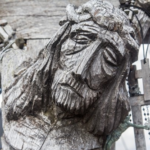We run our website the way we wished the whole internet worked: we provide high quality original content with no ads. We are funded solely by your direct support. Please consider supporting this project.

What the Resurrection Says About the Cross
As with every other aspect of Jesus’ life and ministry, even the resurrection must be understood in light of the cross. This event was not just the resuscitation of a random corpse. It was the resurrection of the Incarnate Son of God who had fulfilled the human side of the God-human covenant by living a sinless life and who, as an unsurpassable expression of divine love, came to earth and entered into the worst of human evil and carried it all on his shoulders. Understood as such, the resurrection can only be viewed as God’s vindication of the self-sacrificial life and death of this God-man through whom God’s eternal character was made known.
For this reason the resurrection must not be interpreted as a display of triumphalist power that contrasts with the humble, cruciform, character of God revealed on the cross as well as throughout Jesus’ ministry. It was rather a display of power that confirmed that the cross is in fact the revelation of God’s true character and that God’s enemy-loving, non-violent, self-sacrificial way of responding to evil is in fact victorious.
It is for this reason that the One who sits on the throne in the Book of Revelation and who alone is worthy to open the scroll of God’s plan for history is the victorious lamb who was “slaughtered” (Rev. 4-5; 21:22; 22:1,4). And it’s for this reason that those who conquer are depicted as doing so because they “follow the Lamb wherever he goes” (Rev. 14:4), bearing witness to his victory and imitating his sacrificial death (Rev. 12:11). Moreover, throughout Revelation we find the emphatic declaration that the glorified and victorious Jesus is the same as the crucified Jesus (see Rev. 5:6, 9, 12; 7:14, 17; 12:11; 13:8; 17:14).
This is precisely why all who have been raised with Christ and who therefore participate in his resurrected life (Rom. 6) reflect their participation by taking on a cruciform character that leads them to sacrificially serve others, including their enemies, just as Jesus did (Rom. 12:7-12). The same point is made by noting that for Paul, the Spirit that dwells within believers is the Spirit of the crucified Christ that empowers them to live according to “the law of Christ” (Gal 6:2), which is to love others as he loved us “when he gave his life for [us]” (Eph. 5:1-2).
Ernst Käsemann is thus surely on the mark when he holds that the cross is “the signature of the one who is risen.”[1] And the surest signature that anyone belongs to him is that they participate in Christ’s risen life, which means they participate in the expression of his self-sacrificial love.
[1] E. Käsemann, “The Saving Significance of the Death of Jesus in Paul,” in Perspectives on Paul, trans. M. Kohl (Philadelphia: Fortress, 1977), 56.
Related Reading

Love Conquers All
Paul prayed in this way for the church at Ephesus: I pray that, according to the riches of his glory, [God] may grant that you may be strengthened in your inner being with power through his Spirit, and that Christ may dwell in your hearts through faith, as you are being rooted and grounded in…

Do the Gospels Fabricate Prophetic Fulfillment?
Skeptically-inclined scholars, and especially critics of Christianity, frequently argue that the Gospel authors created mythological portraits of Jesus largely on the basis of OT material they claim Jesus “fulfilled.” In other words, they surveyed the OT and fabricated stories about how Jesus fulfilled those prophecies. In response, it’s hard to deny that there are certain…

Sin-Bearing God
On the cross, God became our sin, as Paul wrote: “God made him who had no sin to be sin for us” (2 Cor 5:21). However, God didn’t begin to be a sin-bearing God when Jesus walked the earth and hung on the cross. Rather he became Incarnate and bore our sins on the cross…

Challenging the Habit of Judgment
Jesus said, “Do not judge, or you too will be judged. For in the same way you judge others, you will be judged, and with the measure you use, it will be measured to you” (Matt 7:2). In our world where we encounter a nearly constant stream of judgments on social media or the news,…

The Lego Movie & Free Will
Last week Greg tweeted about two movies that have themes related to human free-will and God’s control of the world. They were: @greg_boyd: Does God want a permanently frozen “perfect” world or an open-ended world filled with wildly imaginative people? Watch “The Lego Movie”! @greg_boyd: Meantime, me & some peeps are going to watch (again!)…

Sermon Clip: How Christians Should Respond to Ferguson
In this clip from this weeks sermon, Greg Boyd comments on how Christians should respond to the events in Ferguson St. Louis and how that response should always be in love and to help heal both sides. The full sermon is here: http://whchurch.org/sermons-media/sermon/heart-smart-qa
